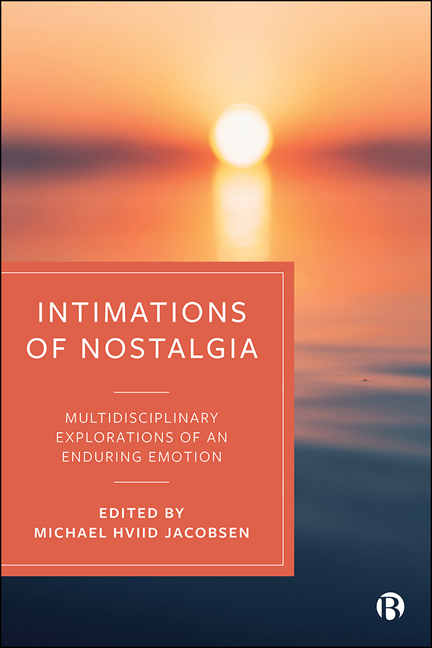Book contents
- Frontmatter
- Contents
- Notes on Contributors
- Preface and Acknowledgements
- Introduction: The Many Different Faces of Nostalgia – Exploring a Multifaceted and Multidisciplinary Emotion
- 1 Philosophy and Nostalgia: ‘Rooting’ within the Nostalgic Condition
- 2 History and Nostalgia: Historicizing a Multifaceted Emotion
- 3 Political Theory and Nostalgia: The Power of the Past in the History of Political Thought
- 4 Sociology and Nostalgia: Micro-, Meso-and Macro-level Dimensions of an Ambiguous Emotion
- 5 Psychology and Nostalgia: Towards a Functional Approach
- 6 Anthropology and Nostalgia: Between Hegemonic and Emancipatory Projections of the Past
- 7 Media Studies and Nostalgia: Media Philosophy and Nostalgizing in Times of Crisis
- 8 Marketing and Nostalgia: Unpacking the Past and Future of Marketing and Consumer Research on Nostalgia
- 9 Literature and Nostalgia: Vestiges of Paradise
- 10 Architecture and Nostalgia: The End of History, the End of the Future and the Prospect of Nostalgia
- Postscript: On Nostalgia of the Future and the Future of Nostalgia – Some Scattered Concluding Observations
- Index
10 - Architecture and Nostalgia: The End of History, the End of the Future and the Prospect of Nostalgia
Published online by Cambridge University Press: 13 May 2022
- Frontmatter
- Contents
- Notes on Contributors
- Preface and Acknowledgements
- Introduction: The Many Different Faces of Nostalgia – Exploring a Multifaceted and Multidisciplinary Emotion
- 1 Philosophy and Nostalgia: ‘Rooting’ within the Nostalgic Condition
- 2 History and Nostalgia: Historicizing a Multifaceted Emotion
- 3 Political Theory and Nostalgia: The Power of the Past in the History of Political Thought
- 4 Sociology and Nostalgia: Micro-, Meso-and Macro-level Dimensions of an Ambiguous Emotion
- 5 Psychology and Nostalgia: Towards a Functional Approach
- 6 Anthropology and Nostalgia: Between Hegemonic and Emancipatory Projections of the Past
- 7 Media Studies and Nostalgia: Media Philosophy and Nostalgizing in Times of Crisis
- 8 Marketing and Nostalgia: Unpacking the Past and Future of Marketing and Consumer Research on Nostalgia
- 9 Literature and Nostalgia: Vestiges of Paradise
- 10 Architecture and Nostalgia: The End of History, the End of the Future and the Prospect of Nostalgia
- Postscript: On Nostalgia of the Future and the Future of Nostalgia – Some Scattered Concluding Observations
- Index
Summary
Introduction
The sentimental feeling for the past (space or time) has some unique features in architecture. One can feel nostalgia for particular spatial experiences of the past, or for some kind of ambiance, if they are missing. Alternatively, space may provoke spatiotemporal travels in our minds that shake our sensorium and challenge the linear sequence of time. Due to its material condition, architecture can firmly connect us with the present, or it can disrupt our feeling of being in the here and now. Furthermore, the feeling of longing may also tie in to how architecture is practised, not just how it is experienced. Architects feel nostalgia in specific ways and, more specifically, in a way that is closely related to the status of labour in societal praxis. During modernity, we have witnessed different forms of architectural nostalgia: architects have experienced nostalgia both for the past and for the future. History and technology have both fuelled these temporal movements. Nonetheless, in a discipline that aspires to eternity, as architecture traditionally has done, nostalgia is a usual suspect closely related to another mood, cultural decadence:
A society that generates a lot of bad movies need not be decadent; a society that makes the same movies over and over again might be. A society run by the cruel and arrogant might not be decadent; a society where even the wise and good can't legislate might be. A crime-ridden society isn't necessarily decadent; a peaceable, aging, childless society beset by flares of nihilistic violence looks closer to our definition. (Douthat 2020a)
If it were not for the mention of cinematography, and if we substituted ‘novels’ for ‘movies’, this quote could have been written in the late 19th century instead of just a few months ago. The quote talks about a kind of decadence engendered by phenomena like the exhausting effect of the tyranny of novelty, the lack of moral leadership, and a nihilism characteristic of bleak individuals who have left their youth far behind them. The text as a whole exudes nostalgia for a form of society that is the opposite of the one it describes: that is, energetic, young, fresh and dynamic.
- Type
- Chapter
- Information
- Intimations of NostalgiaMultidisciplinary Explorations of an Enduring Emotion, pp. 211 - 228Publisher: Bristol University PressPrint publication year: 2021



